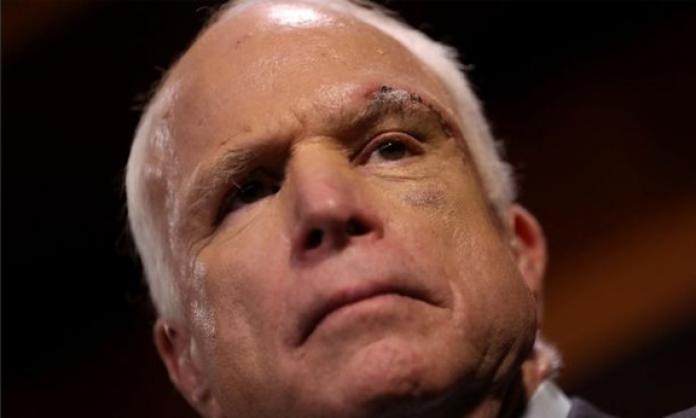Out they rolled, one after the other, gushing obituaries for John McCain, six-term US senator for Arizona, chairman of the Senate Armed Services Committee, who died from cancer on 25 August.
Former president George W. Bush described McCain as “a man of deep conviction and a patriot of the highest order”. Senate majority leader Mitch McConnell said, “In an era filled with cynicism about national unity and public service, John McCain’s life shone as a bright example”.
Democrats joined in the mourning. Barack Obama said that his life demonstrated “the courage to put the greater good above our own”, while Senate minority leader Chuck Schumer described him as one of “the few truly great people” you might encounter: “His dedication to his country and the military were unsurpassed, and maybe most of all he was a truth teller … The Senate, the United States and the world are lesser places without John McCain”.
The newspapers of record joined the eulogies. The New York Times obituary ran to a whopping 6,300 words, the Washington Post‘s to an only slightly less expansive 4,300. The Post editorial described McCain as “the irreplaceable American”, “driven by a code of honour” and “a courageous and principled leader”. Op-ed pieces in the paper described McCain as “last lion of the Senate”, “war hero and giant of the Senate”, and “a maverick we can learn from”.
The tears weren’t shed just by the mainstream political establishment. Senator Bernie Sanders, who in the 1960s fought against the Vietnam War, declared that McCain was “an American hero, a man of decency and honour and a friend of mine. He will be missed not just in the US Senate but by all Americans who respect integrity and independence”.
Alexandria Ocasio-Cortez, newly preselected Democrat congressional candidate for a district in New York City and, like Sanders, a self-proclaimed socialist said: “John McCain’s legacy represents an unparalleled example of human decency and American service”.
The truth about McCain
There is nothing to admire about John McCain.
As a lifelong Republican, he was a filthy representative of the 1 percent. One of his last acts in the Senate was to pass Trump’s tax cuts for big capital and the super rich.
Son and grandson of US Navy admirals, McCain was always an aggressive warmonger. Not just in Vietnam, where he flew 23 missions before being shot down while trying to bomb a factory making civilian goods.
He supported US gun running to the reactionary Nicaraguan “contras” in the early 1980s as part of the US’s efforts to overthrow the Sandinista regime.
He supported the first Gulf War against Iraq in 1991 and imposing sanctions in the years that followed, which bled the country dry and resulted in the deaths of a million Iraqis.
He lobbied hard for the invasion of Iraq in the months following the 9/11 terrorist attack and in 2007 supported sending a further 20,000 troops. In 2006, he helped to enact legislation setting up military commissions to prosecute suspected terrorists and stripping terrorist detainees of habeas corpus rights in court.
He also urged the Obama administration to bomb Libya. And, as chairman of the Senate Armed Services Committee, one of his final acts was to add tens of billions of dollars more to US military budget.
Far from “decent” and “principled”, McCain never fought racism if it meant jeopardising his political advancement. Early in his political career, he voted against the creation of a national holiday honouring Dr Martin Luther King.
In 2000, during the presidential primaries in South Carolina, he defended flying the Confederate flag, saying shortly afterwards he had done so to garner votes. In 2008, he picked Sarah Palin as his running mate for the contest against Obama, giving his hard right wing team mate national respectability and helping to smooth the way for Trump’s later bid for office.
McCain was a crook who escaped far too lightly in the late 1980s after conspiring with four other Senators to lobby federal regulators on behalf of a crooked banker and donor. The later inquiry, which ran for two years, destroyed the careers of his colleagues, but McCain survived.
McCain developed the reputation of someone prepared to stand up to Trump. He cast the deciding vote that prevented Trump repealing Obama’s Affordable Care Act. But this was very much the exception: he voted in the Senate straight down the line for the Republican cause on 83 percent of occasions after Trump’s inauguration.
Given this track record, the effusive ruling class praise for McCain makes sense. He served them well.
But how to explain the tears shed by liberals and social democrats, who often opposed the US wars in Vietnam and Iraq and who would not normally be put out by the passing of a self-described “conservative Republican”?
This goes to one of the worst features of the current political conjuncture in the US, whereby anyone who even vaguely opposes Trump is lionised, no matter what their prior political career. Not just McCain, but George W. Bush, Henry Kissinger, every butcher who has criticised Trump, is now championed by American liberals, their past records carefully swept under the carpet.
Even if liberals criticise some specifics of US imperialism, they nonetheless hanker for the past era of US dominance which, they believe, is being brought to an end by Trump.
In particular, they charge Trump with jeopardising the vital interests of American imperialism due to his attacks on allies in Europe, North America and Asia. Hence their love affair with German chancellor Angela Merkel, Canadian prime minister Justin Trudeau and French president Emmanuel Macron. In this they are joined by the likes of McCain and Bush, who often attack Trump from the right – for being too soft on Russia and China.
No, McCain was no hero. That label belongs to the victims of the US aggression he championed. It applies to the millions of Vietnamese who had their country razed, their fellow countrymen and women killed in their millions and their children deformed by chemical weapons but who continued to fight rather than concede one inch of their land to the likes of McCain and the military-industrial complex he represented.











